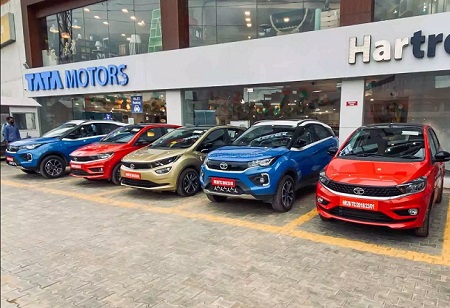Tata Motors, the nation’s largest truck maker, has lined up an investment of more than $1 billion (over Rs 7,500 crore) in the coming 4-5 years to recraft its road map for the commercial vehicle business, with electric vehicles at its core, people in the know said.
The firm that has taken a lead in the passenger electric vehicle (EV) space is transitioning to new-age platforms designed to deliver futuristic EVs in the commercial vehicle (CV) space as well. These vehicle architectures will also be able to accommodate CNG, LNG and diesel powertrains, in a significant shift from the past when fossil-fuelled vehicles were re-engineered to make EVs.
Tata Motors wants to lead and drive electrification in the marketplace just as it did with the conventional power trains in the past, Girish Wagh, executive director - commercial vehicle business, at Tata Motors said. It is working on a range of options catering to the short-range battery-operated vehicles for the last mile with the small CV offerings and gas-based fuel-cell electric vehicles to cater to the more extended range. Still, before that, the shift towards CNG is going to be quick.
"Electrification in CVs will happen through gaseous fuel first. One has seen a significant shift towards CNG; the improved distribution (of CNG) is expected to accelerate further. We have re-looked at the whole range and applications, which we need to work on and prioritise at the back end with a reworked modularity strategy," Wagh said, adding: “A lot of work is happening on delivering solutions with real-world experiences.”
Wagh, though, declined to comment on the amount of investment planned and any moves to set up an EV subsidiary, terming such talks as “speculation”.
The new roadmap is being put in place as the firm is also revamping its sales and marketing interface with the induction of senior marketing
professionals like Shubranshu Singh, who joined from Royal Enfield, and former Ford India managing director Anurag Mehrotra, who will steer its international business and strategy.
Wagh said the total cost of ownership parity in favour of electric over diesel may happen sooner, but it may take a little longer for EVs to get that over CNG vehicles.
Apart from last mile, some steel and cement firms are asking for electric trucks for mining applications, and the company has already started working on a solution.
While there is no defined plan to build an independent subsidiary for the electric CV business at Tata Motors, industry experts said it is almost a foregone conclusion. Right now, there is a big focus on developing a strong product portfolio and building a customer base to secure a healthy valuation at Tata Motors.
To be sure, Tata Motors’ nearest rival, Ashok Leyland, is already out in the market looking for an investor for its EV business under Switch Mobility.
"We invested over Rs 1,800 crore in FY20, which was our highest ever investment for the year; with the upcoming BS-VI phase-2 emission norms and a big focus on EVs and CNG, we may have to invest a similar amount in the coming few years," he explained.
The new portfolio of vehicles is being curated to meet the upcoming BS-VI, RDE or Real-time driving emission standards which will be rolled out on April 1, 2023.
Presently, Tata Motors offers three electric CVs, all buses — 9/9, 12m low floor and 12m regular floor. There is also a whole range of products under works.
Prior this year, the company secured orders for 15 hydrogen fuel cell electric buses from Indian Oil Corp.
Tata Motors has so far supplied more than 650 buses to various state transport undertakings and has secured experience of 20 million kilometers of EV operations on the road.
On a recent meeting between Tata Motors top brass and Tamil Nadu chief minister MK Stalin, Wagh said the company was seeking a small plot for a driving motor training school in the state. The company has been allotted a few acres of land within 48 hours of the meeting and the conversation also extended to serving any public transport requirement — if Tata Motors could do it, he added.
On conversations over Tata Motors’ interest in Ford’s factory near Chennai, Wagh said those were “mere speculations”.
In the meanwhile, the truck maker expects the market to grow 20-22% this fiscal year and the momentum to continue in the coming financial year. The economic recovery is gaining momentum, with the freight load being carried already surpassing pre-Covid levels.
